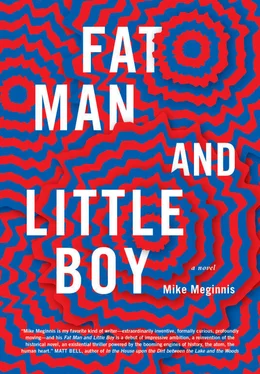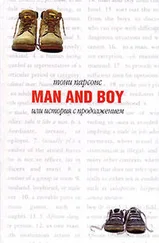“We have to leave town,” says Fat Man. “I can’t face Francine after that. She must hate me.”
“Is she going to be okay?” says Little Boy.
“If she hasn’t left Albert yet she never will.”
“That wasn’t what I meant.”
“Then what did you mean?”
Little Boy says, “I worry about her. Do you think Albert hits her?”
Fat Man shakes his head. Albert has many failings. That isn’t likely one.
“I’ll give Jacques our week’s notice tomorrow,” he says.
Little Boy says, “I want to go home.”
“What home?”
“America.”
“You wouldn’t like it there.”
Little Boy hears the horse or he believes he does. It is distant now, and now more gone, drifting toward the dirt roads and disused lots at the city’s outer edge. Little Boy will not be allowed to touch the horse’s mane. He will not get to watch it breathe. The mud is shaking loose from its hooves. Its footsteps are more crisp and clear than ever, though they are very far away.
“We’ll live out in the country,” says Fat Man. “There are too many people here.”
“Is there work for you in the country?”
“Should be something. If not, we’ll eat squirrels.”
Francine and Albert are fighting so loud Fat Man and Little Boy decide to wait outside the house. They sit beneath the window, legs folded, eyes closed.
Little Boy says, “What are they fighting about?” He rubs his ears to keep them warm.
Fat Man says, “He’s angry she’s pregnant.”
“So he worked it out.”
“He thinks it can’t be his kid.”
“Why not?”
“I think he uses something called the withdrawal method.”
“What’s that?”
“It’s when you take it out before you finish. She’s explaining that pre-ejaculate has sperm in it too.”
“I don’t know what that means,” says Little Boy, looking up at the stars, breathing little chalk clouds.
“Then how do I know?”
“We’re supposed to know all the same things?”
“I thought we did,” says Fat Man. “We’re brothers.”
“Not anymore,” says Little Boy. “I mean, not about being brothers, but about knowing. You know French now.”
“You really don’t?”
“Not so much. Some foods, mostly. Greetings, goodbyes. We’re more different now than we used to be.”
“Now she’s asking him why he doesn’t take her to get an abortion the way he does with everyone else,” says Fat Man.
“Well why doesn’t he?”
“Suppose she dies. How would that look?”
“That’s not what he’s saying, is it?”
“No. He says he doesn’t want to put her through all that.”
“So they’ll have the babies?”
“One more reason to leave,” says Fat Man.
“Imagine those eyes. Staring up at you as if you made the world and everything good,” says Little Boy.
“When really you destroyed it.”
Rosie watches someone else’s cigarette butt burn out orange then gray in the ashtray on her table. She is waiting for service. She is tired.
After Fat Man and Little Boy passed out on stage, the medium had stormed off, leaving the audience to fend for themselves. The hidden pianist played a few resounding chords as if to resolve the evening. An F, a C minor, a major C, and that was that. The crowd filtered out into the night like powdered sugar through a sifter, and Rosie went with them, jostled at every interval by strange men and beautiful women, the latter wearing stylish homemade dresses. As she walked through the streets, Rosie reflected on what the medium had told her. It was possible her father had spoken through the Oriental woman—she especially believed it after the medium’s climactic histrionics, and the smells that fogged the theater when the show was over. In her hotel room, after the medium, she had prayed for guidance, and apologized for idolatry, if that was what she had done. So far, God was keeping mum, but that was his way. The Lord was not a talker.
In any case, her father was wrong. Her husband is dead, she will not marry again, she will not have babies, she cannot have babies.
A waiter bustles by. She consults her dog-eared phrasebook for a firm way of saying, “No one has helped me yet.” There are no firm ways of saying anything in her phrasebook. The closest she can come is, “J’apprécie votre aide.” She looks up from her phrasebook and the waiter is gone. She lights a cigarette. The smoke tickles her throat and makes her eyes feel dry. She flips through the phrasebook, searching for things she might need to say soon. “How are you with a broom?” for instance. Can you cook? Do you keep a clean home? How is your English?
She tallies her expenses. The cigarettes come first as they are very guilty things. Then the room she has rented, which she will quit tomorrow morning. Then the meals she has eaten—which were more expensive before someone told her, with unnecessary surliness, that in France one does not usually leave a tip—and meals she will eat. The hat she bought herself, which she has since lost. The apple she snacked on, the orange, the bread she took to her room, and the soft brie. Every day she thanks the Lord she has already bought the land. A spendthrift like her would otherwise be short of money long before she arrived, she is sure. The cigarette is half-done, and so there is half of one eighth, a sixteenth, then, of the money she spent on the pack, burnt away. It’s all gone so quickly, and that’s just like her, to waste. She needs to keep a certain amount. She is afraid to look in her hotel safe to see if she still has that amount; she always runs through money faster than she thinks, and then she feels cold inside, and skips meals to close the gap between expectation and fact.
The waiter comes by again. She is resolved to ignore him unless their eyes meet. Of course their eyes do. She says, “J’apprécie votre aide.”
The waiter cocks his head. He asks her if she’s been helped, but she doesn’t understand.
She is not sure what this means. It doesn’t matter. “Un sandwich au rosbif,” she says, “et un café.” This too from her phrasebook, pages 25 and 28. She mentally deducts the sum of this lunch from the diminishing heap of her savings. She thanks the waiter in English.
A boy sweeps in the corner, corralling dust and crumbs. He has the slow, steady rhythm of someone who knows he will be sweeping the same spot clean the next day and the day after that. He collects it in his dustpan, disappears, and comes back before her lunch. He lifts a chair, propping it up on its forelegs against the table, sweeps out from beneath it, and sets the chair back down.
That’s him, she thinks, the boy from the night before. The one the medium called up. She hadn’t realized, sitting in the audience, how thin he was. He hadn’t looked so tired.
“Hello,” she says. “Come sit at my table with me.”
He startles at her flat, Midwestern English. His lips twitch.
He shrugs, saying, “No English,” affecting a mealy French accent.
She pats the seat beside her. “That’s a lie. Come on.”
“I’m supposed to clean.”
“I’m a respected hotelier. No one will punish you for doing what I say.”
Little Boy does as she asks, setting his dustpan on the table, holding his broom erect in the crook of his elbow. When she asks his name he answers “Matthew,” his voice a sullen croak. She snuffs her cigarette. He watches the last wisps of smoke, and then the tray. His bulging eyes are hesitant to meet her own. His hands fiddle in his lap.
Rosie asks, “Are you wondering if I recognize you from last night?”
“I was.”
“Well,” says Rosie. Her waiter approaches with sandwich and coffee. He leaves without acknowledging the boy. “See, I told you. The customer is always right. Is Matthew really your name?”
Читать дальше












